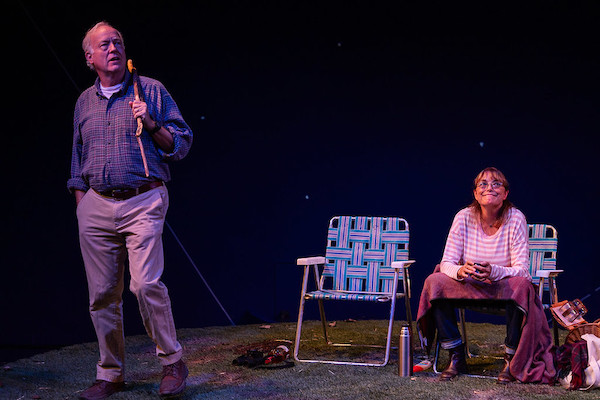Theater Review: “Lunar Eclipse” — Stepping into the Light
By Bill Marx
Dramatist Donald Margulies seems to be putting his hand on the heart of the heartland — as well as taking the pulse of a pair of aging boomers.
Lunar Eclipse by Donald Margulies. Directed by James Warwick. Staged by Shakespeare & Company at the Elayne P. Bernstein Theatre, Lenox, MA, through October 22.

Reed Birney and Karen Allen in the Shakespeare & Company production of Lunar Eclipse. Photo: Maggie Hall
It is off-base to slot Lunar Eclipse‘s aging married couple, he irascible, she conciliatory, as descendants of the bickering duos in two-handers such as The Gin Game. We are presented with a pair — named George and Em — sitting out late on a summer evening in the fields of a farm in the American heartland. They are out to view a lunar eclipse, though no doubt they are also catching glimpses of “the stars — doing their old, old crisscross journeys in the sky.” Yes, the character’s names are a playful allusion to Our Town but, for me, the drama’s attenuated vision of the Midwest aligns more closely with that of another American writer – William Gass. His incisive story “In the Heart of the Heart of the Country” characterizes the rural community as a “dissonance of parts and people.” At one point, a man goes into his house, shuts his door, and closes his eyes — “there’s simply no way of knowing how lonely and empty he is … here in the heart of the country.” Dramatist Donald Margulies seems to be putting his hand on the heart of the heartland — as well as taking the pulse of a pair of boomers who may no longer be in love.
Dissonance and loneliness are the pervading impressions, particularly regarding the patriarch. George is cantankerous, isolated, and troubled. We initially see him crying, alone, before Em joins him. What follows turns into a therapeutic talkfest (mitigated by flickers of humor via George’s whiskey-fueled snarl) as a concerned Em succeeds (somewhat) in getting her husband to open up about his sadness. The cause might be the death of one of his beloved dogs or the fate of the farm. Or it could be he is weeping for himself: George is haunted by intimations of mortality (he says he knows for sure how Em and he will die), fears of Alzheimer’s/mental breakdown (he is having episodes of disorientation). Or could his tears be the result of a deep malaise, his sense that the world has gone topsy-turvy (Trump? the Climate Crisis?). For Em, the underlying tragedy of their marriage is the death, in his mid-30s, of their adopted son, from a drug overdose. She remains wracked with guilt; she feels she should have done more to help him overcome his addiction. George says he never took to the kid, who seems to have been troubled from the get-go. The guy is more attached to his loyal dogs than to his wayward son … or his wife.
The see-sawing between George and Em presents, at times, a moving picture of a marriage haunted by trauma. But the pair’s emotional conflicts slide by, partly because Margulies has divided up the scenes to coincide with (announced) phases of the lunar eclipse. The idea may be to contrast the implacable movements of the cosmos (a nod to Wilder) with the fragility of humanity. But it ends up being an irritatingly mechanical interruption of the confab, and that sense of clockwork is reinforced by the set, which oh-so-slowly turns. A coda that flashes back to the couple’s early meeting also feels like an attempt at pathos that is there to check off a box.
And then there is George’s intriguing nightmare that something horrible is happening to the planet, that we have headed into a global downward spiral. What is he going on about? Is it a hysterical diversion from his blues, or is he tapping into a real cultural anxiety that hazards are coming that cannot be controlled or escaped? Unfortunately, the issue is dropped as the lunar eclipse trundles along. Em is too conventional a spouse (and character) to follow up.
You wonder about George’s state of being because Shakespeare & Company’s world premiere production is personable, well acted enough to maintain our interest in the pair’s cris de coeur, particularly Reed Birney, who, beneath the farmer’s macho-lite crustiness, suggests a possibly debilitating vulnerability. Perhaps, underneath the fatigued bravado, George senses just how lonely and empty he is. As Em, Karen Allen glides over the pain that Birney hugs more effectively — but her Em skillfully supplies the nurturing strength that might be keeping George on his rounds, now that his favorite dog of all time has died.
Ironically, Lunar Eclipse‘s darkest moment, at least for me, has nothing to do with the eclipse. It is when Em reassures George that he should not be all that concerned about what will happen to the farm once he is dead. Let Walmart buy up the land. On the one hand, Em makes a reasonable point. Who cares what happens once you are gone? But then there is George’s alarming belief that the world is going — and will continue to go — haywire. In the future, the heart of the heart of the country may be in for a seizure.
Bill Marx is the editor-in-chief of the Arts Fuse. For four decades, he has written about arts and culture for print, broadcast, and online. He has regularly reviewed theater for National Public Radio Station WBUR and the Boston Globe. He created and edited WBUR Online Arts, a cultural webzine that in 2004 won an Online Journalism Award for Specialty Journalism. In 2007 he created the Arts Fuse, an online magazine dedicated to covering arts and culture in Boston and throughout New England.
